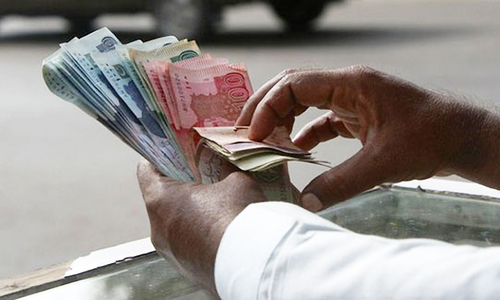ISLAMABAD: Chief Justice Mian Saqib Nisar revealed on Wednesday that Pakistan did not have enough funds to cater for the imports of two months prior to the launch of the tax amnesty scheme.
Now with the amnesty scheme, the situation had improved to such an extent that the government had enough resources to pay salaries of its employees and pensions [of retired employees], he said while heading a two-judge bench that had taken up a case pertaining to loan write-off.
The chief justice observed that the funds generated through recovery from the loan defaulters would be utilised for construction of dams in the country.
The suo motu case was initiated in 2008 on press reports that the central bank had quietly allowed commercial banks to write off non-performing loans under a scheme introduced by former president Pervez Musharraf.
Says funds from loan recoveries to be spent on dams
On May 13 the Supreme Court had asked representatives of 222 industrial units to appear before the court and then asked them to furnish comprehensive reports to explain their position.
The observation came when senior counsel Farooq Naek sought time to respond to the options the court had offered in its last order of June 30 after weighing all the pros and cons.
The chief justice said that public interest had to prevail over the interest of individuals and postponed further proceedings till July 17.
The court also dropped hints that special banking tribunals might be constituted to try the loan defaulters, adding that the appeals against decisions of the tribunals would be heard only by the Supreme Court.
In its last order of June 30, the Supreme Court had decided that in the first instance all of the borrowers, including 222 industrial units, would be given an option to deposit with the court 75 per cent of the differential between the amount sanctioned and the amount to be recovered.
If a borrower deposits this amount within a timeframe then no further action will be taken against it otherwise their cases will be referred to the banking court.
The banking court will then reconsider the entire case within a period later to be fixed to determine whether the loan was written in a lawful manner or by way of any abuse of power or the law.
For this purpose the banking court will be entitled and bound to look behind the position as may have emerged in consequence of the application to Circular 29 issued by the State Bank of Pakistan in relation to the written off loans.
According to the order, this exercise will be carried out within the parameters laid down in Section 8(1) of the Financial Institutions (Recovery of Finances) Ordinance 2001.
The banking court will be at liberty to issue a notice to the financial institution concerned or the State Bank if it deems it appropriate but it will not be bound to do so. In case the borrower fails or refuses to appear before the banking court it will proceed against it ex parte and in such a situation will be entitled to assume that the waived off amount comes within the parameters of section 8(1). If the banking court concludes that any amount is recoverable, it will make an appropriate order, which will be deemed to be the decree of the court and will be executable accordingly and also in terms as herein after stated.
In respect of any borrower that avails the option of banking courts their properties and assets will be deemed attached with immediate effect from such date as may be specified by the court.
If a borrower that chooses to avail the banking court option deposits with this court the differential amount referred in the first option within the stipulated period then such borrower may make an application to the banking court and on such application, if that court is satisfied that the amount has been so deposited, it may make an order declaring that the order of attachment will cease to operate in relation to such borrower and its directors / partners / controlling persons. The amount so deposited will be subject to adjustment or return, as the case may be, depending on the outcome of the proceedings before the banking court.
The apex court also pointed out that since the order of attachment would apply in terms of the orders of this court, any disobedience or violation would amount to be tantamount to contempt of court and the concerned parry / persons would be liable accordingly.
Published in Dawn, July 5th, 2018












































